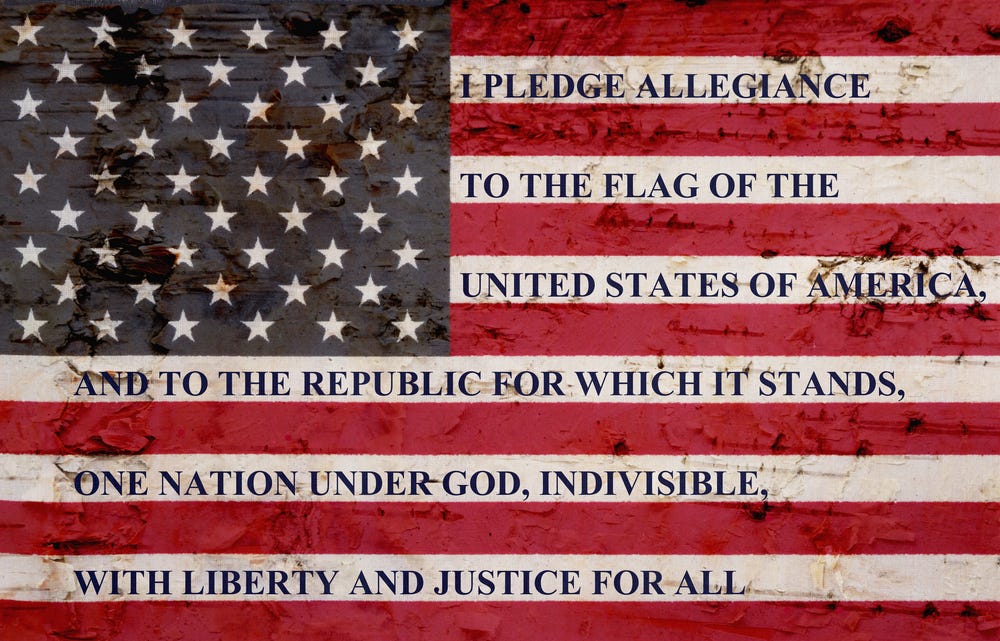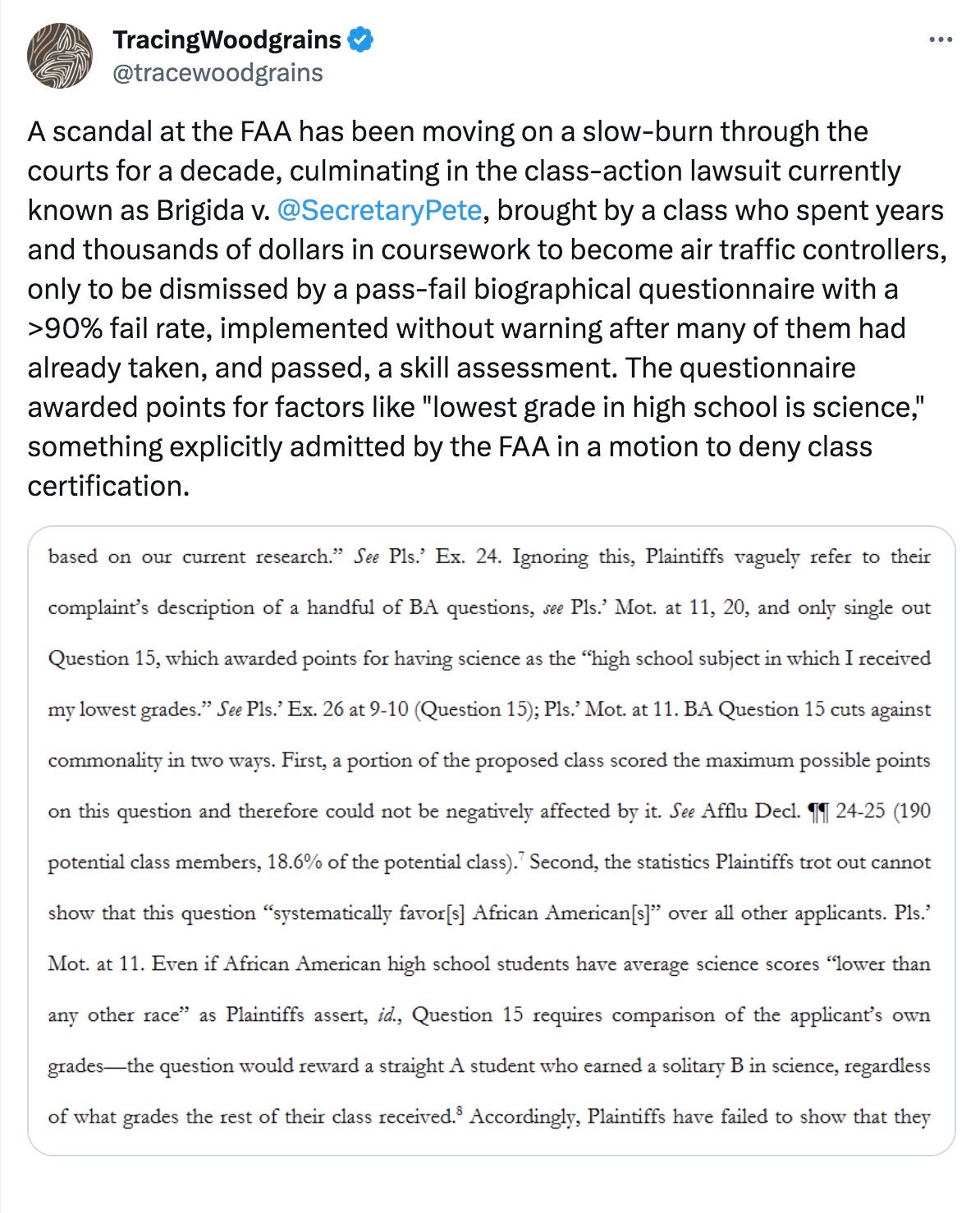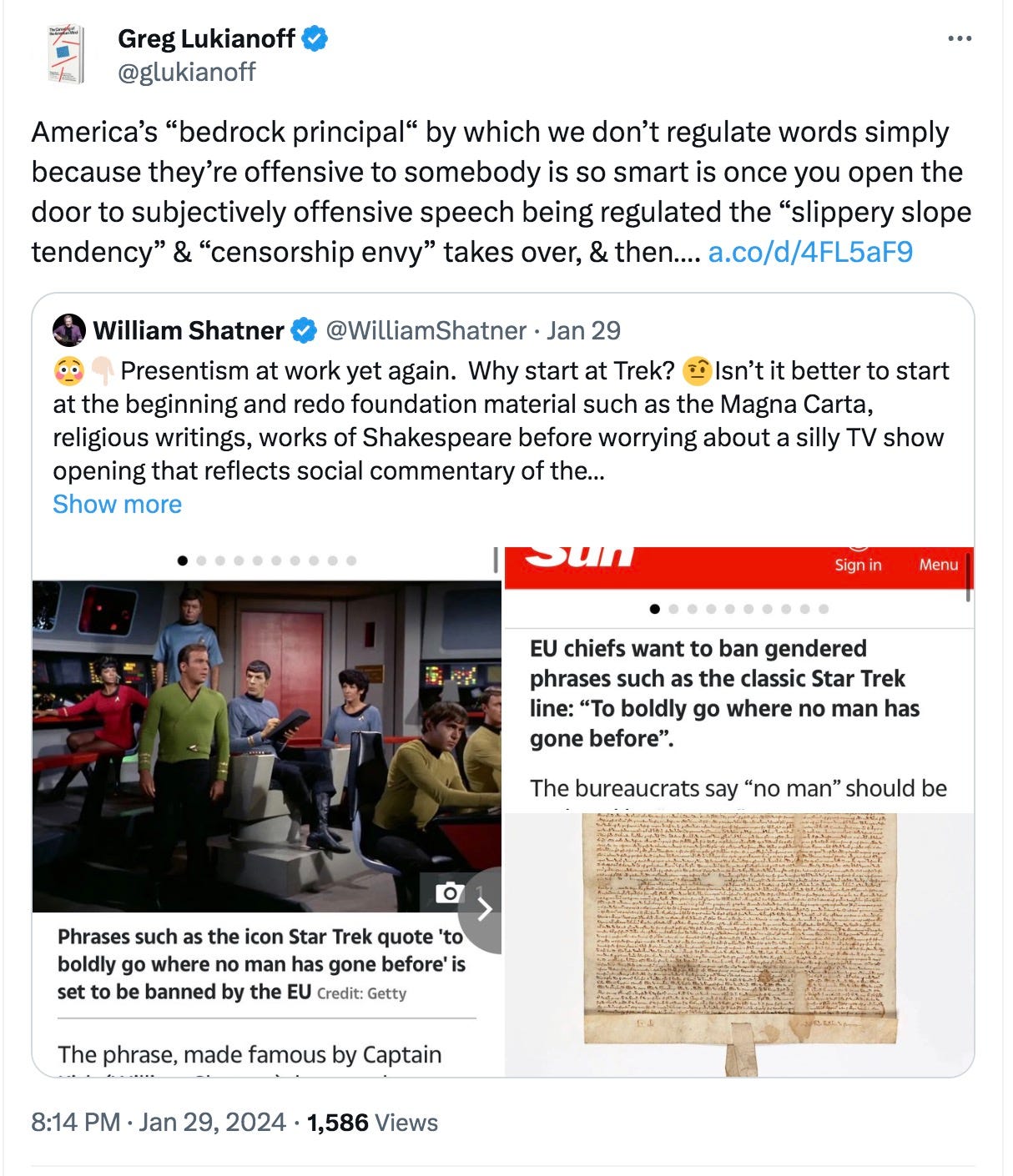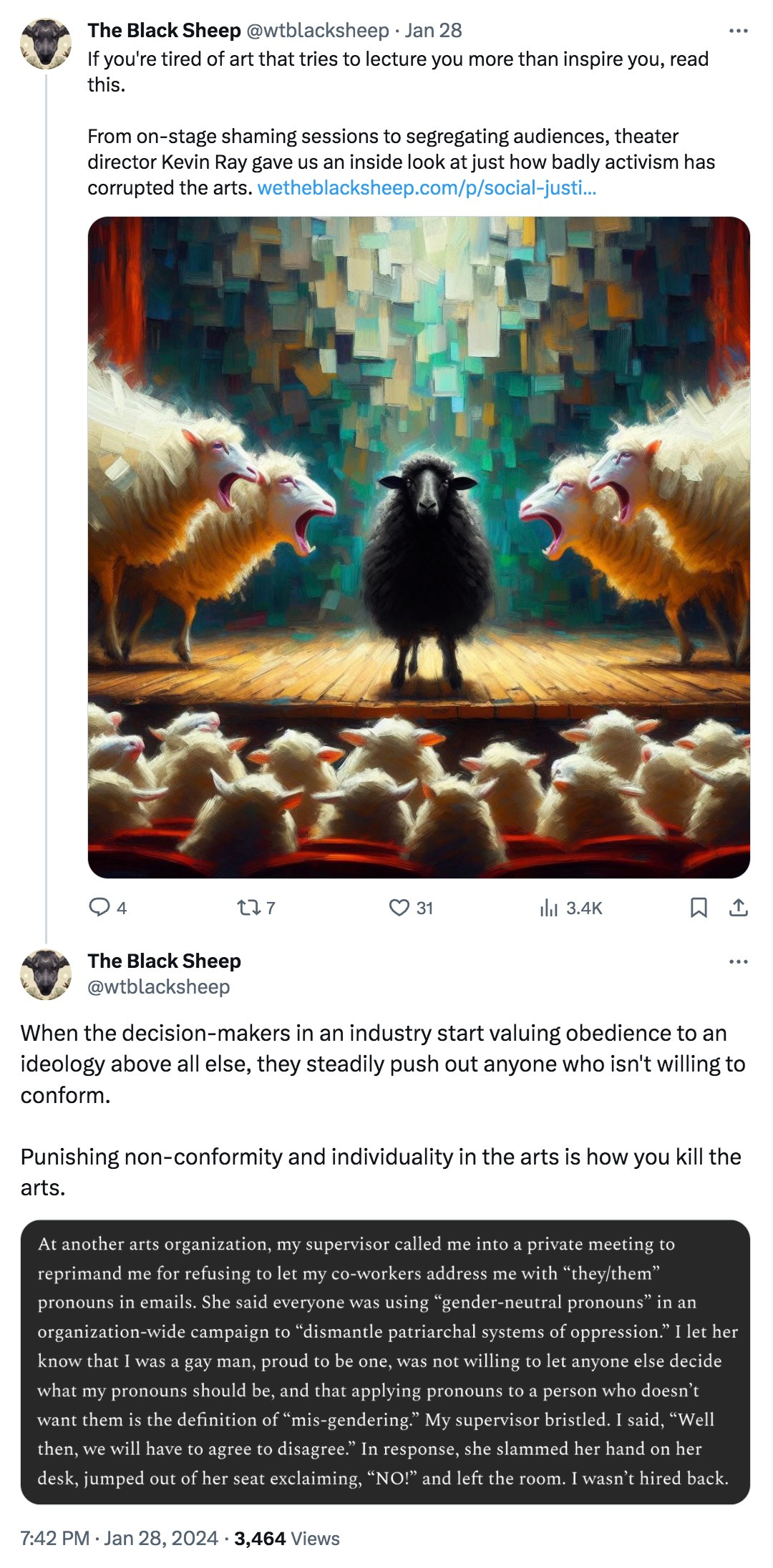E-Pluribus | January 30, 2024
Racial essentialism; two great forms of government that work great together; and if families are not OK, society can't be far behind.
A round-up of the latest and best musings on the rise of illiberalism in the public discourse:
Conor Friedersdorf: ‘A Constant Drumbeat’ of Racial Essentialism
If diversity is a good thing, then Conor Friedersdorf of The Atlantic has an encouraging story about the growing diversity of opposition to DEI. In a recent ruling in a case involving Penn State, Barack Obama judicial appointee Wendy Beetlestone referred to the “constant drumbeat of [racial] essentialist, deterministic, and negative language” that characterized the work environment at the university.
Zack De Piero taught writing for four years in the English department at Penn State’s Abington campus. Then he resigned and, in 2023, filed a lawsuit alleging that administrators and other faculty members discriminated against him because he is white. In his telling, the school’s diversity, equity, and inclusion initiatives violated the Civil Rights Act of 1964 by creating a hostile work environment. In response, hundreds of academics signed an open letter calling the lawsuit a reactionary attack on “ongoing efforts in diversity, equity, inclusion, and belonging.”
[. . .]
This isn’t a case where, say, a white Donald Trump appointee who hates academia took an extreme position, like “Any departure from color-blindness is illegal,” that would be overturned on appeal. This particular judge is more difficult for DEI partisans to dismiss. Wendy Beetlestone, a Black district-court judge born in Nigeria, was appointed to the bench by Barack Obama. She was announced last year as the University of Liverpool’s next chancellor; she is clearly not hostile to higher education. And the substance of her ruling is hard for would-be critics to reject in full.
Beetlestone sided with Penn State in dismissing multiple claims, such as that De Piero was subject to “disparate treatment” and that his First Amendment rights were violated. “We are gratified by the judge’s decision to dismiss the majority of Mr. De Piero’s claim,” a Penn State spokesperson wrote in an email to me, “and we will vigorously defend the sole claim the court allowed to proceed.”
[. . .]
She is clearly not an “anti-woke” ideologue. Still, the ruling declared, “the way these conversations are carried out in the workplace matters: When employers talk about race—any race––with a constant drumbeat of essentialist, deterministic, and negative language, they risk liability under federal law.”
What did De Piero describe that struck the judge as plausibly constituting that “constant drumbeat”?
After the murder of George Floyd in 2020, all Penn State faculty and staff were told to attend a “Conversation on Racial Climate” on Zoom. During the session, Alina Wong, an assistant vice provost for educational equity, “led the faculty in a breathing exercise,” De Piero’s complaint states, “in which she instructed the ‘White and non-Black people of color to hold it just a little longer—to feel the pain.’”
On at least four other occasions in 2020 and 2021, the judge wrote, De Piero “was obligated to attend conferences or trainings that discussed racial issues in essentialist and deterministic terms—ascribing negative traits to white people or white teachers without exception and as flowing inevitably from their race.” One session involved a presentation about “White Language Supremacy.” Another included examples of ostensibly racist comments “where every hypothetical perpetrator was white,” the judge continued.
[. . .]
Whether or not De Piero prevails at trial, Beetlestone’s ruling could have an effect on how schools approach DEI. The kind of DEI programming described in De Piero’s complaint is widespread on college campuses; I’ve encountered many examples of similar programming through my reporting. Now lawyers may scrutinize that programming partly with Beetlestone’s ruling in mind. And colleges hoping to avoid liability or costly lawsuits may study the fact pattern that Beetlestone saw as plausibly unlawful. If they’re doing anything similar, they may reconsider.
That’s why people who see DEI initiatives as racist or regressive are excited by this lawsuit—which was filed with financial support from the Foundation Against Intolerance and Racism, a civil-liberties group—while supporters of DEI initiatives are lamenting it. As the writers of the open letter criticizing the case put it, “We understand the stakes of this lawsuit, which regardless of its outcome will have a chilling effect on [DEI] and antiracist initiatives throughout systems of higher education.”
Read it all here.
Ben Klutsey & Jay Cost: Why America Is Both Democracy and Republic
“You got your republic in my democracy! You got your democracy in my republic!” That’s how a Reese’s Peanut Butter Cup commercial may have gone if the delicious snack had existed around the time of the nation’s founding. At Discourse Magazine, Ben Klutsey interviews author and historian Jay Cost about his new book (without candy references,) Democracy or Republic? about how elements of both characterize the United States.
KLUTSEY: Now, back to the title of the book: “Democracy or Republic?” Why should we conceive of these two concepts together—that it’s not solely a democracy and it’s not solely a republic, but we have to consider these two things as sort of joined together?
COST: Right. That’s a great question. “Democracy” in its most straightforward definition means “the rule of the people,” which, in the 21st century in Western civilization, is—I sort of point out—it’s a hegemonic type of government. You cannot be taken seriously by calling for a return to hereditary monarchy. Insofar as there was a debate about which systems of government were best, that debate is now over. That’s a debate from the past; it no longer exists. Democracy “won.”
However, and this is an important point, there are all sorts of limits that we all accept around democracy. The very notion of individual rights implies limits to what the people are able to do. If “democracy” literally translates as “the rule of the people,” there are certain things that the people are not allowed to do. This speaks to what a republic is.
The word “republic” really refers to the ends of the state rather than the means by which the state comes to the ends. Democracy is the means: The people rule. A republic points to the ultimate goal of the rule of the people. From Latin, it means “res publica” or “the public affair.” The function of a government in a republic is to rule for the entire political community.
These two ideas combine, and the reason they combine is because you can have oligarchic republics. Like the Roman Republic was oligarchy; you could even say ancient Sparta was oligarchy. Usually—a lot of it depends on who you count as citizens. The United States, because every native-born person or every naturalized citizen over the age of 18 can vote and participate, that really makes us a democratic republic.
The way I think that the two ideas fit snug together was really well expressed by Abraham Lincoln at the Gettysburg Address, in which he called for the salvation or protection of government “of the people, by the people”—those are both democratic—but the “for the people” line: that government has to work for the entire political community rather than just some subset of it.
That’s what separates a democratic republic from a democratic tyranny, which is another point that I make in the book, is that it’s conceivable that a majority in a democratic system, after acquiring the levers of power, can use that power simply to enrich themselves. That’s not a republic; that’s a majoritarian tyranny. That’s a democratic tyranny. A democratic republic implies the people rule, but ultimately for the purpose of the entire political community.
Read or listen to the whole thing.
Ann Bauer: America’s Families Are Not Okay
The health of a society is tied to the health of the families it’s comprised of. Given that premise, author Ann Bauer has bad news. Writing at Persuasion, Bauer says the bonds that once tied one generation to another are weaker than ever, and that spells trouble for the entire country.
“Writing off your parents used to be a big, shameful thing to do,” says April. “But lately, it’s almost like it’s bragging rights to estrange from your family. Now people want to talk to me because of it. Then they tell me about their parents and how terrible they were, how they’re going ‘no-contact,’ but they have these dumbass reasons. You find out they estranged because their dad denies climate change. I want to say, ‘Relationships take work. You actually have parents who love you. Don’t you care at all?’”
But family estrangement, once taboo, has become fashionable, a cause for both grief—as families mourn their missing loved ones—and celebration, with young adults seen as brave and empowered for casting off their elders.
Recent studies show more than one in four adult children in the United States are or have been estranged—defined as having no contact or a poor relationship with limited contact—from one or both parents. Over the summer, Cosmopolitan published a long article titled, “Why So Many Young People Are Cutting Off Their Parents.” Conversations about “going no contact” and estrangement are now mainstays on daytime talk shows and social media. Something is not only driving families apart but leading them to talk about it more openly.
[. . .]
In fairness to the estrangers, definitions of abuse do change over time: As recently as the 1970s, parents felt justified rejecting a child who was gay, whereas today that would be seen by nearly all of us as a bigoted, unloving stance. For many Americans, spanking a child is no longer seen as a reasonable punishment.
The question is whether society has swung too far the other way, in the direction of demonizing the benign. Today, irritating parental behaviors once seen as funny or ethnic—prying, overstepping, giving personal advice, meddling (think the stereotypical Greek or Italian moms of Y2K-era hits like “My Big Fat Greek Wedding” and “Everybody Loves Raymond”)—are viewed as “toxic.”
“Suddenly everyone is ‘toxic,’” declared an August 2022 essay in The Atlantic by Kaitlyn Tiffany, exploring the sudden dramatic rise in people online prescribing estrangement as the remedy. “Maybe #toxic posts are popular because relationship drama is good entertainment, especially on TikTok—an app for teenagers whose literal role in society is to explore the full spectrum of irrational behavior,” Tiffany speculated. But if it had started as drama and entertainment, she worried, it might not stay that way: “At a time when our most intimate relationships really do seem to be becoming more brittle, it’s hard to laugh off the possibility that some people are taking all of this to heart.”
[. . .]
One thing seems certain: Estrangement is passed down through generations. A 2015 British study found that 54% of estranged respondents agreed with the statement “estrangement or relationship breakdown is common in our family.” I’ve heard from two momfluencers who claim they estranged from their own parents in order to have better, closer relationships with their kids. But rarely is this how it works out. The reality of family estrangement is that once you start, it spreads.
Read it all.
Around Twitter (X)
Here’s just a small part of a long-form tweet about a simmering scandal at the FAA. (Click to read it all.)
Via Greg Lukianoff, here’s Captain Kirk, er, William Shatner with news of Star Trek’s pending cancellation:
And finally, from The Black Sheep, when is art not art? When it’s a lecture:









